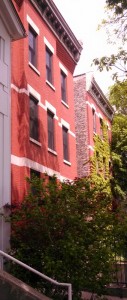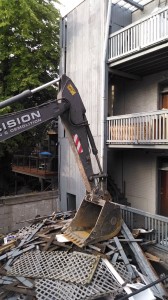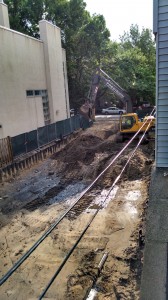Uncertain Terrain
My home is in an apartment in Chicago. Originally constructed in the late 1800s, our building was renovated in the 1980s and four units were created. When our building went up in the 19th century, a sister building was constructed next door. However, the sister building was never renovated. The two of them sat side by side on a tree-lined street. Our neighborhood is Lincoln Park, an area of the city becoming wealthier – or at least our small part of it is. Large-scale real estate development is taking place nearby. We also see smaller changes on a regular basis, from more places that sell lattes to expensive cars parked on the streets.
Our neighborhood is Lincoln Park, an area of the city becoming wealthier – or at least our small part of it is. Large-scale real estate development is taking place nearby. We also see smaller changes on a regular basis, from more places that sell lattes to expensive cars parked on the streets.
In the fall, we learned that the sister building next to us had been purchased. Renters in the building steadily moved out. In the spring, we learned that the structure was going to be demolished. A new, single-family structure would go up in its place. There was talk about profit, timing, and the changing nature of real estate in a big city.
The demolition was speedy.
One day a back hoe appeared and made quick work of the garage at the back of the lot. 
It sat silent for a few days.
Then the back hoe went to work, tapping here, tapping there. The bricks gave up relatively quickly. The noise during the day made conversation difficult. At night it calm. The air smelled of earth, dampness and dust.
Workers appeared and steadily bundled the bricks. The market for reclaimed bricks is brisk. Older bricks can give new construction “authenticity.”
With a few days of work, it was over. What used to be was no longer. A vacant lot sits by our home. It was not an important building. It was not architecturally significant. Its residents were transient and did not take great care of the property. There was no mourning and no one protested.
It was not an important building. It was not architecturally significant. Its residents were transient and did not take great care of the property. There was no mourning and no one protested.
That said, the building’s disappearance troubled me. I found it unsettling.
I am not nostalgic. I completely understand and appreciate the developer’s actions. The vibrancy of a city rests on a foundation of change and growth.
Something is missing, though, when absences are created without reflection. In thinking it through, I realized was that it wasn’t the building’s demolition that bothered me – it was the lack of attention. A piece of Chicago’s history disappeared and no one took notice.
We need not archive and document all the time. And please, let’s not pass laws that make it impossible for cities to change or grow.
We can, though, pay attention and take notice. Doing so makes us more aware and more alive.
Here’s to being engaged and paying attention – and to a forgotten building.
David Potash